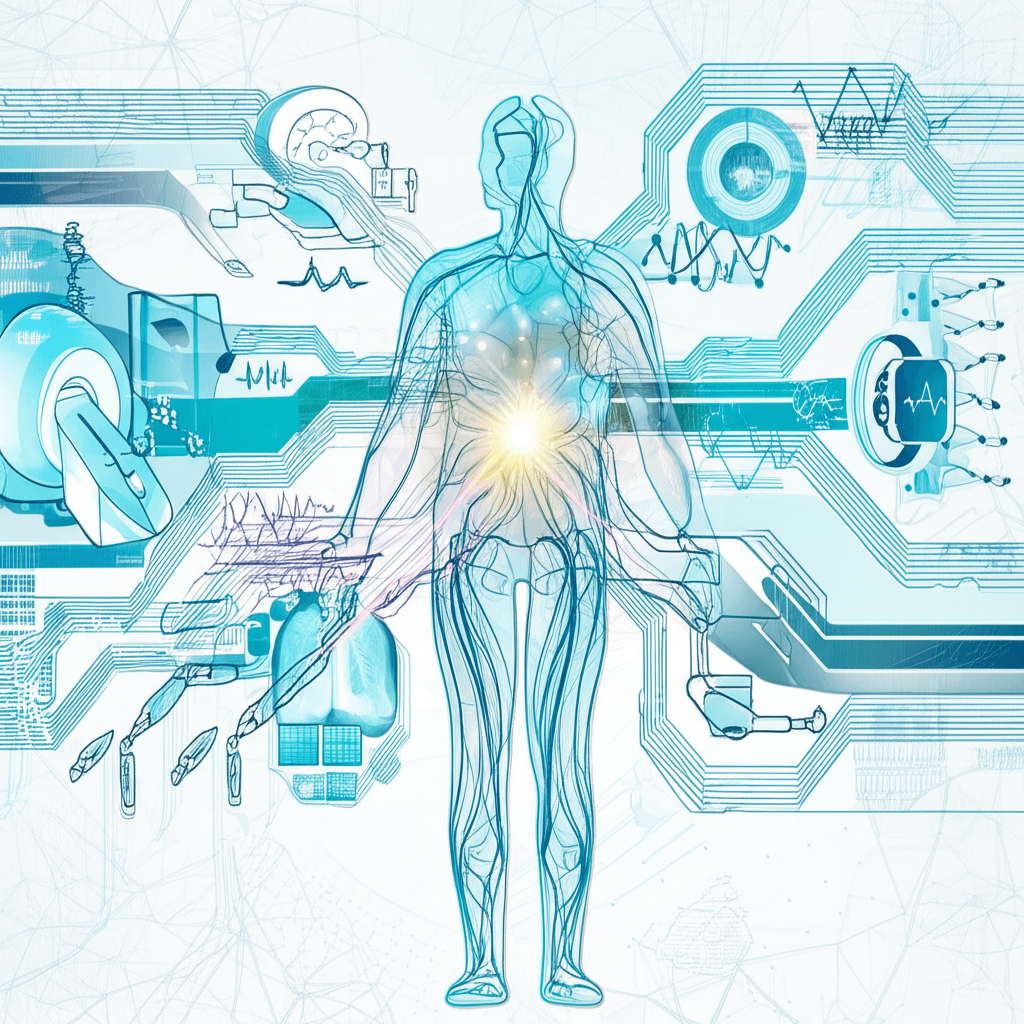Generative AI Fuels MedTech Revolution, Transforming Patient Care
Generative AI is profoundly transforming MedTech, accelerating R&D, enhancing diagnostics, and personalizing patient care amidst evolving regulatory landscapes.
June 12, 2025

A transformative wave of innovation, driven by artificial intelligence, is currently reshaping the landscape of medical technology. This evolution spans the entire MedTech ecosystem, from the development of sophisticated new hardware and software to the integration of AI into clinical applications and the complex regulatory frameworks that govern them. At the heart of this revolution is generative AI, a technology with the potent ability to create novel content, such as synthetic medical images and predictive patient data models, which is already demonstrating its capacity to overhaul traditional healthcare processes.[1][2] This technology is not merely an incremental improvement but a paradigm shift, automating complex tasks, enhancing decision-making, and fostering breakthroughs in areas from research and development to patient care delivery.[1][3] The result is a healthcare system poised for greater efficiency, accuracy, and personalization, moving away from reactive treatments toward proactive and predictive health management.
The engine powering much of this transformation is generative AI, which is being applied across a vast spectrum of healthcare domains. In pharmaceutical research and development, AI algorithms are accelerating the drug discovery process by identifying potential drug candidates and predicting their efficacy, potentially shortening development timelines by up to 50%.[4][5] These systems can analyze massive biological datasets to uncover new therapeutic targets that might otherwise be missed.[6] This extends to clinical trials, where AI can create synthetic patient data to test therapies without risking patient privacy and can optimize trial design and recruitment in real-time.[3][6] Beyond R&D, generative AI is streamlining the MedTech supply chain through improved demand forecasting, inventory optimization, and predictive maintenance of manufacturing equipment.[6][7][5] Companies are leveraging AI to not only create efficiencies but also to design entirely new medical products, using generative design algorithms to produce thousands of optimized variants for implants and devices, a process that once took engineers months.[8][2]
The tangible impact of AI is most evident in the surge of new intelligent medical hardware and software as a medical device (SaMD). The U.S. Food and Drug Administration (FDA) has seen a dramatic increase in authorized AI/ML-enabled devices, rising from just a handful in 2015 to 221 in 2023, with a cumulative total of over 1,000 by 2024.[9][10][11] Radiology and medical imaging are the most penetrated specialties, where AI excels at detecting subtle abnormalities in scans that might be missed by the human eye.[12][13][14][15] For instance, AI algorithms can detect lung nodules with high sensitivity and assist in flagging breast cancer on mammograms, increasing diagnostic accuracy.[16][15] Companies like GE Healthcare and Siemens Healthineers are leading the market with numerous FDA-authorized AI devices.[9] GE's Air Recon DL, for example, enhances MRI image quality while reducing scan times by up to 50%.[9] Beyond imaging, AI is being integrated into a variety of devices, including smart stethoscopes, AI-powered surgical robots, and personalized insulin delivery systems.[9][17][18] Wearable devices from companies like Apple and Fitbit now use AI to monitor for conditions like atrial fibrillation, providing continuous health insights directly to the consumer.[9][19]
The integration of these AI-powered tools is profoundly altering clinical workflows and the delivery of patient care.[16] AI is helping to alleviate the significant administrative burden on clinicians by automating tasks like writing clinical notes, scheduling, and billing, freeing up more time for direct patient interaction.[20][21][22] Studies have shown that this can lead to managing medical records 47.61% more efficiently and increasing patient-facing time by nearly 47%.[21] In diagnostics, AI-driven tools provide clinicians with enhanced decision support, analyzing patient data from electronic health records, imaging, and genetics to recommend personalized treatment plans.[12][22][16] This not only improves diagnostic accuracy and reduces errors but also facilitates a move towards precision medicine, where treatments are tailored to an individual's unique biological profile.[12][14][23] AI-powered platforms can predict patient admissions, optimize the allocation of hospital resources, and even forecast disease outbreaks, enabling more proactive and efficient healthcare management.[24][23][25]
However, the rapid proliferation of AI in MedTech presents significant regulatory and ethical challenges.[17][18] Regulatory bodies like the FDA and the European Union's agencies are grappling with how to ensure the safety and efficacy of these complex technologies, especially adaptive algorithms that learn and change over time.[17][26][18] This has led to the development of new frameworks, such as the EU's AI Act, which aims to regulate AI applications across sectors while working in concert with existing rules like the Medical Devices Regulation (MDR).[27] Key concerns include data privacy, the potential for algorithmic bias leading to health disparities, and the need for transparency in how AI models make decisions.[1][17][18] Ensuring that AI systems are trained on diverse and representative datasets is crucial to prevent unequal care.[1] Furthermore, establishing clear liability rules for harm caused by AI technologies is a complex legal question that needs to be addressed to protect patients without stifling innovation.[28] The successful and equitable integration of AI into the MedTech landscape will depend on a holistic approach that balances rapid innovation with robust governance, ethical considerations, and a steadfast focus on augmenting human expertise to improve patient outcomes.[3][29]
Sources
[1]
[2]
[5]
[10]
[11]
[12]
[13]
[14]
[15]
[17]
[18]
[19]
[20]
[21]
[22]
[23]
[24]
[25]
[26]
[29]